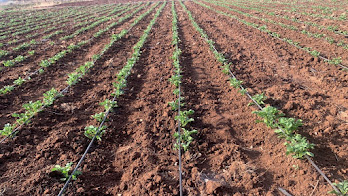The Importance of Agriculture
Written by Elfas Mcloud Zadzagomo (Hunter)
1. Food Security: Agriculture is the primary source of food production worldwide. By cultivating crops and raising livestock, agriculture provides the essential food and nutrition required to sustain human life. It ensures that people have access to an adequate and nutritious diet, reducing the risk of hunger and malnutrition.
2. Economic Development: Agriculture is a significant contributor to the economy of many countries, particularly those with a predominantly rural population. It provides employment opportunities, and income generation, and contributes to national GDP. Additionally, the agricultural sector serves as a foundation for other industries such as food processing, agribusiness, and trade.
3. Rural Livelihoods: Agriculture is the primary source of income and employment for millions of people, especially in rural areas. It supports the livelihoods of smallholder farmers, farm laborers, and rural communities, helping to alleviate poverty and reduce inequality. By investing in agricultural development, governments can uplift rural economies and improve the quality of life for rural populations.
4. Environmental Sustainability: Sustainable agricultural practices are essential for preserving natural resources and mitigating environmental challenges. Agriculture can contribute to climate change through deforestation, greenhouse gas emissions, and intensive farming methods. However, sustainable agricultural practices, such as organic farming, agroforestry, and water conservation techniques, can minimize environmental impacts and promote biodiversity conservation.
5. Rural Development: Agriculture is closely linked to rural development as it provides the foundation for social and economic progress in rural areas. Investments in agricultural infrastructure, irrigation systems, access to credit, and agricultural research and development can enhance productivity, create employment opportunities, and improve rural infrastructure and services.
6. Global Trade: Agriculture is a significant component of international trade. Many countries rely on agricultural exports to generate foreign exchange earnings and stimulate economic growth. Agricultural trade contributes to global food availability, allows countries to specialize in specific crops, and fosters economic interdependence and cooperation.
7. Innovation and Technology: Agriculture has witnessed significant advancements in technology and innovation, leading to increased productivity and efficiency. Modern agricultural practices incorporate technologies such as precision farming, biotechnology, and mechanization, enabling farmers to produce more with fewer resources and improving overall agricultural productivity.
8. Food Diversity and Cultural Heritage: Agriculture cultivates a diverse range of crops, reflecting the cultural heritage and traditional practices of different regions. Preserving agricultural biodiversity is crucial for maintaining food diversity, conserving traditional knowledge, and safeguarding cultural heritage.
Given these reasons, it is evident that agriculture is a vital sector that affects various aspects of human life, including food security, economic development, environmental sustainability, and social well-being. Governments, organizations, and individuals must recognize the importance of agriculture and work towards its sustainable development and resilience in the face of emerging challenges such as climate change, population growth, and resource constraints.




Comments
Post a Comment